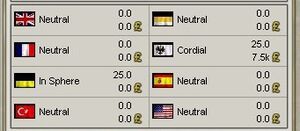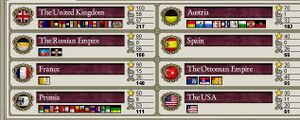(merge from offical wiki) |
|
(没有差异)
| |
2020年10月9日 (五) 16:26的版本
Influence is a mechanic unique to the eight great powers in the world. These nations can influence nation which are not great powers. Influence is spent on nations automatically over time, based on priorities set on the Diplomacy screen.
Influence will be divided among all nations with a priority set, with one share going to nations with Low priority, two shares to nations with Middle priority, and three shares to nations with High priority. The influence you accumulate can then be used for different diplomatic actions with the ultimate goal being the ability to add the nation to your sphere of influence. Note that if only one nation has a priority set, it will receive all influence regardless of how high the priority is. Similarly, setting two nations to high priority, and setting the same to medium will give the same result. Influence are generated on a daily basis, and if no country is prioritized, the influence is lost so great powers should always be influencing at least one nation.
The Race for Influence
Influence is spent on nations automatically, based on priorities set on the Diplomacy screen.
You cannot increase influence in anation if your embassy has been banned by a competing power(see diplomatic actions bellow), you are at war with said nation, or you have a truce with the country, but in these cases that nation is ignored for purposes of influence. So the influence is not wasted, but merely spend on other prioritized nations.
You get a base of 0.25 influence per day which is then altered by percentage modifiers on each nation. These modifiers are added, so a -50% modifier and a +75% modifier would work out to a +25% adjustment to daily influence gain being applied. Once a great power has 100 influence with another nation, any further influence investments will be spent on reducing the influence reserves of competing great powers. If all other great powers are at 0 influence and does not prioritize the nation in question, the influence is wasted.
Influence modifiers:
- Power: The percentage of the influencing nation's total score that it is higher than the target nation's total score is given as a bonus to the influencing nation. This has a maximum +100% bonus, against nations with a score of zero, but can become a penalty in the rare case that a great power has a lower score than a non-great power.
- Vassals: A nation gets +100% bonus to influence with its puppets and dominions.
- Relations: A nation's relations with the target nation is divided by ten and applied as a bonus or penalty (allowing for a maximum +20% bonus, or a minimum -20% penalty).
- Neighbor: A nation that shares a border with the nation attempting to influence it grants a +50% bonus.
- Other Continent: A nation on a different continent than the nation attempting to influence it gives a -50% penalty. Note that it is possible to have both the Neighbor bonus and Other Continent penalty.
- Other Foreign Investors: If a nation has invested in the target nation, a -50% penalty will be applied to all other influencers, unless they reduce the penalty by investing in the target nation themselves. If multiple nations have made investments, each suffers a penalty equal to -50%*(1 - Nation'sInvestment/TotalForeignInvestment). For example, if Nation A has invested £10,000 and Nation B has invested £20,000, then Nation A will suffer a 33.3% penalty, and Nation B a 16.6% penalty. Once a nation is suffering from this penalty, the only way it will ever disappear completely is if the other nation's investment is somehow removed e.g. by the decision Seize the means of production.
- Population: Influencing nations get tremendous penalties in target nations with populations over 10 million (such as China and its larger substates), making them effectively impossible to sphere.
Opinion
Opinion is a measure, separate from relations that ranks how close or far a great power is from adding a nation to its sphere of influence.
The tiers, in descending order:
- In Sphere
- Friendly
- Cordial
- Neutral
- Opposed
- Hostile
Secondary powers that break free of a sphere of influence via the decision Leave Sphere of Influence will immediately drop down to "Opposed" opinion.
If a country has friendly opinion towards a great power and is on the losing side of a defensive war, the great power may intervene in the war. This automatically adds the "Status Quo" war goal and usually causes the great power to become a war leader.
Diplomatic Actions
As you gain influence with a nation, you can use that influence to do the following diplomatic actions. Note that any actions affecting other great powers can only be done if you have equal or higher opinion than that great power(as an example, you cannot discredit a great power that has cordial opinion with a nation unless you also have cordial or higher opinion of that nation). Unlike other diplomatic actions, actions regarding influence to not require any diplomatic points.
- Increase Opinion (50 Influence) - increases a nation's opinion of your nation to the next tier. Also gives +20 relations.
- Decrease Opinion (50 Influence) - decreases a nation's opinion of another Great Power to the tier below. Also gives -10 relations with the great power.
- Add to Sphere (100 Influence, requires Friendly opinion and the nation not to be in any sphere of influence) - Adds a nation to your sphere of influence.
- Remove from Sphere (100 Influence, requires Friendly opinion and the nation to be in another great power's sphere of influence) - Removes the nation from a great power's sphere of influence. Also gives -10 relations with that great power. You can use this action to remove a nation from your own sphere as well. Removing a nation from your own sphere gives you a penalty of -10 prestige and +1 infamy.
- Expel Advisors (50 Influence) - Removes all the influence of another Great Power. Particularly effective if they have a high amount of influence. Also gives -5 relations with the great power.
- Ban Embassy (65 Influence) - Removes all the influence of another Great Power, and prevents them from influencing that nation for 1 year. Also gives -10 relations with the great power.
- Discredit (25 Influence) - Slows the rate of influence gain of another Great Power by 75% (additive with other bonuses) for six months. Also gives -5 relations with the great power.
Sphere of Influence
Adding a nation to your sphere of influence can be done peacefully by using the "add to sphere" diplomatic action or by releasing a nation. It can also be done militarily by several different casus belli. You can lose a sphered nation if you or another great power uses the "remove from sphere" diplomatic action or if the sphered nation becomes a great power itself. A revolution in a nation resets all diplomatic relationships, and thus removes the nation from any sphere of influence.
Benefits of Spheres
- If a nation is part of a great powers sphere of influence, a portion of its internal market is joined with its master country and all other members of that sphere of influence, making a larger and more versatile common market. The size of the portion depends on the status of the sphered nation. For uncivilized countries you get access to 100% of their market, for civilized countries 75% and for secondary powers 50%. For civilized and secondary powers, you can increase the percentage by investing in the country.
- Provides prestige when a nation is added to your sphere of influence
- Nations that are sphered are likely to accept all diplomatic requests, such as alliances and military access.
- A sphered nation won't be called into war against its sphere leader, even if it is an ally or satellite of the nation being attacked.
- Enables some unification events and decisions.

